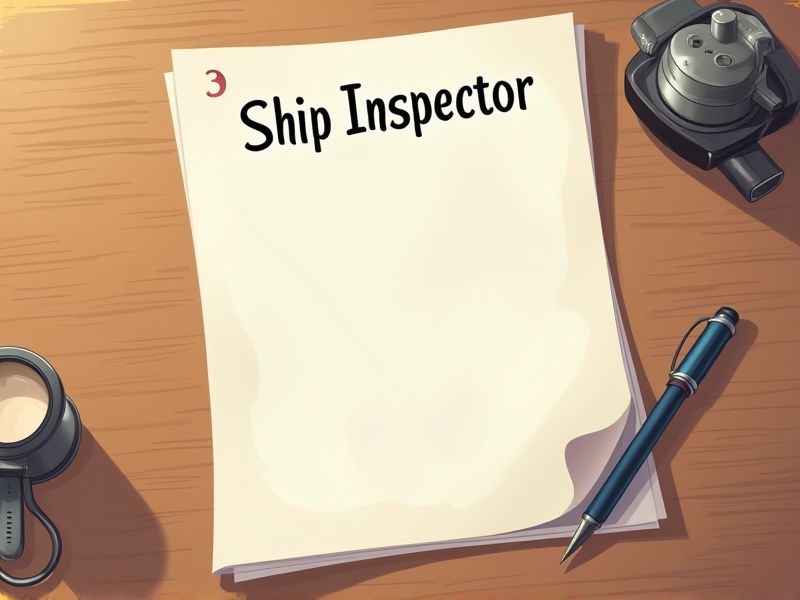
Ship Inspectors play a crucial role in maintaining maritime safety and ensuring compliance with international regulations. Certifications provide inspectors with the specialized knowledge and skills required to assess the condition and integrity of vessels accurately. Without these qualifications, the risk of overlooking potentially hazardous issues increases dramatically, leading to potential safety and environmental repercussions. Here are some important certifications you may need as a Ship Inspector.
STCW Basic Safety Training Certification
The STCW Basic Safety Training Certification ensures a Ship Inspector has fundamental knowledge of maritime safety regulations, crucial for identifying compliance issues. Possessing this certification provides essential skills in emergency response and survival techniques, enabling inspectors to handle potential onboard crises effectively. Such training equips inspectors with the ability to assess safety equipment and protocols accurately, ensuring vessels meet international maritime standards. Compliance with STCW standards fosters credibility and trust between ship inspectors, the maritime industry, and regulatory bodies.
ISPS Code Certification
The ISPS Code Certification ensures that ship inspectors are equipped with the knowledge to assess and enhance maritime security measures effectively. With this certification, inspectors can identify potential vulnerabilities and security threats at ports and on vessels. Compliance with ISPS Code is a prerequisite for ships to dock at many international ports, and certified inspectors play a critical role in maintaining this standard. Ship inspectors with ISPS Code Certification help to foster a secure maritime environment by ensuring adherence to international security protocols.
Marine Surveyor Certification
Marine Surveyor Certification ensures that ship inspectors possess the specialized knowledge required to assess vessel safety and compliance with maritime regulations. Certified surveyors are equipped to identify potential hazards, which can prevent costly incidents and improve overall maritime safety. The certification standardizes the skills and qualifications necessary for ship inspections, aiding in consistent evaluations across the industry. It also enhances the credibility and trust in inspectors' decisions, benefiting shipowners, insurers, and regulatory bodies.
USCG Marine Inspector Credential
The USCG Marine Inspector Credential is required as it ensures that ship inspectors possess the necessary technical knowledge and skill set to evaluate vessel safety in accordance with U.S. regulations. The credential also serves to maintain high standards of maritime safety, thereby reducing the risk of accidents and promoting compliance within the industry. It provides a framework for inspectors to consistently apply safety and maintenance standards across different vessels, enhancing overall operational efficiency. By holding this credential, a ship inspector gains credibility and trust from maritime stakeholders, facilitating smoother interactions and inspections.
ABS Surveyor Certification
The ABS Surveyor Certification ensures inspectors maintain a standardized level of competence recognized globally within the maritime industry. Achieving this certification provides assurance that the surveyor has been trained to identify and address crucial safety and compliance issues on vessels. Shipping companies benefit from the credibility and reliability certified inspectors offer, reducing risks associated with maritime operations. To meet regulatory requirements and enhance vessel safety, many maritime organizations mandate certified professionals for ship inspections.
DNV GL Surveyor Certification
DNV GL Surveyor Certification ensures that ship inspectors have the necessary qualifications to evaluate vessel safety standards accurately. This certification provides a standardized framework that helps maintain consistent inspection criteria across different vessels and regions. Shipowners rely on certified surveyors to ensure compliance with international regulations, which enhances operational credibility. Inspections conducted by DNV GL certified surveyors could lower the risk of maritime accidents and their associated costs.
IMO Safety Management Systems Auditor Certification
The IMO Safety Management Systems Auditor Certification enhances a ship inspector's competency in evaluating compliance with international safety standards. This certification ensures that inspectors have the necessary skills to identify and mitigate potential safety risks on ships. As shipping regulations become more stringent, certified auditors play a crucial role in maintaining safety and operational efficiency. The demand for qualified auditors rises as shipping companies aim to adhere to global safety requirements and avoid legal and financial repercussions.
NDT Level II Certification
Ship inspectors require NDT Level II Certification as it ensures they possess the skills to accurately detect flaws and defects in materials without causing damage. This certification guarantees that inspectors can competently interpret and evaluate test results, thereby maintaining vessel integrity and safety. With proficiency in various testing methods like ultrasonic and radiographic testing, inspectors can effectively uphold industry standards. The certification also boosts regulatory compliance by providing assurance of thorough examination practices.
Certified Welding Inspector (CWI)
A Certified Welding Inspector (CWI) is essential for ship inspection because they ensure weld quality, which directly impacts the structural integrity of the vessel. Poor welds can lead to failures in the ship's structure, risking safety and operational efficiency. Having a CWI on board ensures compliance with maritime and welding standards, minimizing the likelihood of costly repairs and downtime. The presence of a CWI provides assurance to stakeholders about the reliability and safety of the ship's construction.
ISO 9001 Internal Auditor Certification
ISO 9001 Internal Auditor Certification equips ship inspectors with the ability to evaluate quality management systems effectively. Without this certification, ship inspectors may lack standardized tools necessary for assessing compliance with international quality standards. When the inspectors are certified, it reduces the risk of overlooking critical quality issues that could lead to costly repairs or operational failures. Certification ensures consistency and reliability in inspection processes, which enhances the overall safety and performance of maritime operations.
Summary
By obtaining certifications, you enhance your qualifications as a Ship Inspector, which can lead to increased credibility in the industry. Certified inspectors often gain access to more job opportunities and the potential for higher earnings. Employers value the certified skills, resulting in you being considered more favorably during hiring or promotional decisions. Certification also equips you with updated knowledge and practices, improving the safety and efficiency of ship inspections.
